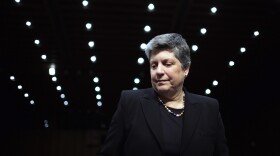Iran's supreme leader, Ayatollah Ali Khamenei has shut down any possibility of direct negotiation with the U.S. over its nuclear program. In comments on his Facebook page, Khamenei said his country wouldn't accept an offer under pressure.
"Having relationships and negotiating with countries who had no deceit against us is in our national interest....Given the history and current facts, our nation won't negotiate under pressure or (with) those threatening us."
The statement is a rebuff to comments from Vice President Joe Biden, who declared over the weekend that the U.S. was ready for face-to-face negotiation with Iran. At an international security conference in Germany, Biden said any such talks "must be real and tangible and there has to be an agenda that they are prepared to speak to. We are not just prepared to do it for the exercise."
At first, Biden's remarks were guardedly welcomed by Iranian foreign minister Ali Akbar Salehi, who was optimistic last Sunday: "I would like to say that these are good signs...We are a rational government and we look into resolving all outstanding international issues through negotiation," according to state-run Iranian Press TV.
But a few days later, Khamenei may have cut off that possibility. "Negotiating with America will not solve any problems," he told an audience of air force officials today, according to the Guardian. "American policy in the Middle East has been destroyed and Americans now need to play a new card. That card is dragging Iran into negotiations."
But Iran is going to international negotiations on Feb. 26, just not with the U.S. alone. Iranian negotiators will meet representatives from a group of countries called the P5 plus 1: the U.S., Britain, China, France, Russia plus Germany. They'll gather in Kazakhstan and their main topic is Iran's controversial nuclear program. The Washington Post reports that since this diplomatic group last met in June, 2012, "Iran's economy has been battered by U.S. and European economic sanctions, including an oil embargo that has wiped out half of Iran's oil exports. Iran's currency, the rial, tumbled to a record low against the dollar in the past week."
Copyright 2021 NPR. To see more, visit https://www.npr.org. 9(MDAxNzg0MDExMDEyMTYyMjc1MDE3NGVmMw004))






